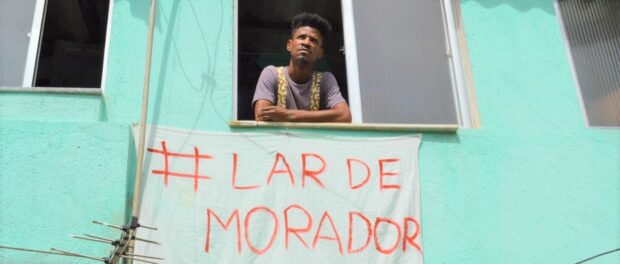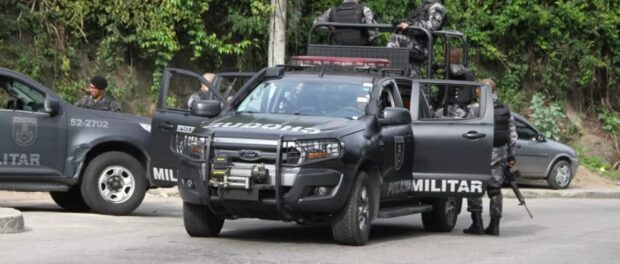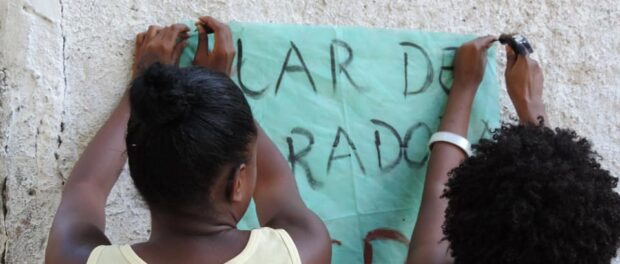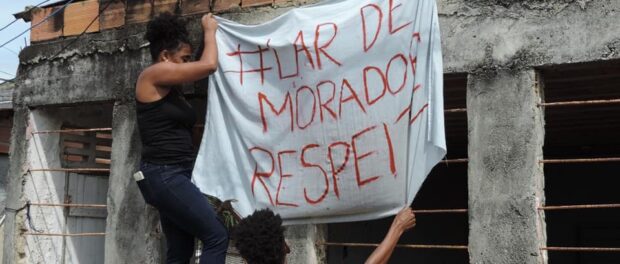
This is our latest article about Covid-19 and its impacts on the favelas. It is also part of a series created in partnership with the Center for Critical Studies in Language, Education, and Society (NECLES), at the Federal Fluminense University (UFF), to produce articles to be used as teaching resources in public schools in the city of Niterói.
For over 20 days, residents of Complexo do Viradouro, made up of Largo da Garganta and the favelas of Africano, União, Papagaio, Viradouro, and Cruz, have lived with the routine of a police occupation. Launched on August 19, the occupation is being carried out despite the ADPF das Favelas, a Brazilian Supreme Court decision that bans police operations during the Covid-19 pandemic, except in “absolutely exceptional” cases.
Following the legal requirements, according to the State Secretariat of Military Police, the operation in Complexo do Viradouro was reported to the State Public Prosecutor’s Office of Rio de Janeiro. However, there is no information so far as to whether the Office has any knowledge of the events as a police occupation, nor what justifies the “exceptionality” claimed by the Police.
What is publicly known, as reported by RioOnWatch, is that the police operation—which calls for the installation of armored police cabins to monitor the area at the end of public works projects—has brought residents fear and militarization, with police abuses and human rights violations affecting multiples favelas.
In this report, Alessandro Conceição, 37, a resident of Morro da Reunião, one of the favelas of Complexo do Viradouro, recounts the first days of the police occupation and the resistance movement organized by residents, predominantly black, of Complexo do Viradouro, home to over 6,000 people.
On Friday August 21, at about 7:30am, they sent me a message. I responded, worried. I am told about the worsening of abuse by the police. I requested help spreading news of the situation in Viradouro to the newspaper El País, emphasizing that even with the Supreme Court ban on police operations, one is now happening in our favela. The reporter said he would check with his editor and I’m still waiting. Niterói is one of the most racially segregated cities in the world. You only need to look it up.
Afterwards, I went by the Center of the Theater of the Oppressed. Arriving at Viradouro Plaza, it looked like a war zone. Lots of cars and men from Rio’s Shock Police (Batalhão de Choque). The vehicles and uniforms of the Shock Police are much darker than those of the ordinary Military Police (PM). I found out that in these cases, the ordinary PM can’t intervene much, but need to stay in the rear guard, giving support. I noticed a strange fact: it seems that there is no dialogue between these police divisions, and the PM are a little subordinate to the Shock Police, with their hands tied. I remembered American films, when the FBI arrive and say to the local police: “You can go, the FBI is here now!”
The rain, the coercion, and the police intimidation meant that only about 20 people came down to the plaza. The majority are the black women who live at the top of the hills in the surrounding area. We stayed in the square being watched by the Shock Police. We were all scared that they would film us, and the topics discussed circled around reprisals and how the community is cowardly. I feared that this type of discussion would make us lose focus. For various legitimate reasons, we did not initiate a protest just then, but we spoke about strategies and the possibility of doing one on Saturday morning (August 22) with a roundtable discussion at a community breakfast. We put up signs made with pens and notebook pages asking for respect and for them [the Shock Police] not to trash our houses. A video of a resident who works at a local health center, and who who later found her house turned upside down, circulated on social media.
I went home to sleep. In conversation, I learned that the police were there at the house at about 6am. But, that they were polite and asked to enter. They stayed on the balcony, searched the people in the house and asked if anyone was addicted to anything. As they found nothing, they left.
I tried to sleep while more of this went on. At about 10pm, I was woken up. Someone had alerted that the police had taken one of my neighbors and given him a “pretty beating.” It was nighttime, there were many police vehicles in the community, and it was raining hard. I left the hill and went to look for my neighbor. I met up with other people who were also looking for him. Nobody had any news about him. We called all the contacts, we thought about going to the police stations, until we decided to ask the police doing the occupation if they had stopped someone called Pedro.*
We swallowed our fear, pride and rage. I, surrounded by four black women from the hilltops, was there, very calm. One of them squeezed my hand and said: “Let me ask,” with a relaxed smile and her two big eyes open, wide open, to contain me. I understood the message. She asked the police officer and we gave my neighbor’s full name. The police officer replied that they had stopped him, but that he had been released. We looked at each other, we believed him, and we asked ourselves: “Where could this person be?” I remembered Amarildo! We decided to return to our houses, to our favelas, and wait. As soon as I arrived home, I received a message telling me that Pedro had appeared at Maria’s* house. Immediately, and relieved, Maria calls me to give me the good news. I then went back to sleep to be able to dream of tomorrow.
On Saturday (August 22), the roundtable discussion didn’t happen either. The leaders of the residents’ association are worried that people are feeling more ill because of the heavy rain that was still falling. “And in this pandemic it’s the poor people who suffer most, right?” someone from the leadership said to me in an audio message. A plausible argument. I almost applauded. But, together with friends we are thinking how to realize a protest, since the police occupation will continue for awhile.
On Sunday (August 23), the sun came out. I received messages saying good morning, with flowers and positive messages from one of the members of the association’s management. Great! I decided to go to the center to buy insulation tape. The wiring here at home is having problems. I went down by the soccer court and saw two police cars and many Shock Police officers. The [Brazilian championship] game between Flamengo and Botafogo was nearing its end [the league is playing without supporters]. Botafogo was winning 1-0. Alemão, the young man working at the stall, didn’t serve me because he supports Botafogo and he said that he couldn’t take his eyes off of the TV because if he did, they would give a penalty to Flamengo. In front of his shop, in the bar, a group of men, residents of the community, weren’t taking their eyes off of the TV either. They were devastated, they are Flamengo supporters.
At the shop, I took what I needed and left the money on the counter. Farther ahead, in another bar, two Shock Police cars. The police officers were listening to the game on the radio. One of them, also a Flamengo supporter, said: “It is not possible that Flamengo is going to lose this game!” The other was only focused on the radio. I walked a bit further and in another bar, there were more men. “Hi Gugu!” they said, greeting me. When I waved back, penalty! For Flamengo. Goal! For Flamengo. I looked around and all the men (residents and police) either celebrated (the majority) or lamented the tie. I looked around again and thought: “At this moment, there will probably be no shooting.” And there wasn’t. The game finished! It was a tie!
Before the game, the police even went to the house of a relative of mine in Morro do Africano. According to him, they were polite and asked my 13-year-old-nephew, who was on the sofa, to stand up. They didn’t end up entering. But, they continued wandering around the surrounding area.
I went to buy newspapers. When I came back to the community, there were more Shock Police vehicles and the tension was back. The game continues!
Tomorrow there will be more survival strategies.
*Pedro and Maria are fictional names used to protect the safety of residents.
Photos of #LarDeMoradorRespeite (#RespectResidentsHomes) by Gabriel Horsth
Alessandro Conceição is a resident of Morro da União, a journalist, and a Master of Ethnic and Racial Studies. A versatile black “artivist” with the Center for the Theater of the Oppressed, his journey with the theater started in 2001 with the play Pirei na Cenna, mental health projects, culture points, and with the formation of popular theater groups, in addition to experiences performing in Argentina, Bolivia, Chile, Colombia, the United States, Guatemala, Nicaragua, Spain, Mozambique, Zambia, Senegal and Uruguay. In the antiracist fight he is an artist-activist from the group Color of Brazil (Cor do Brasil) and the collective Siyanda Black Experimental Cinema. In the arts of life he has been a street vendor, a trainee at a bank, an attendant in a chocolate shop, and a social educator.



